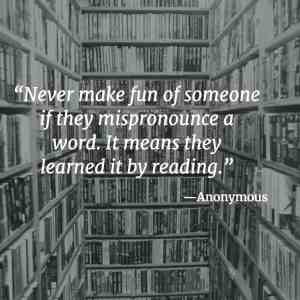From infancy onward we learn how to pronounce words by hearing others talk and from reading books. When it comes to literature, often we find words invented by the author or ones that weren’t, but we don’t frequently hear. They are often the names of people, places and things, but not always. In all cases, we are prone to mispronouncing them, out loud or just in our heads.
Names and words can be spelled the same but pronounced differently depending upon where and from whom you hear them. For example, the name Guy in French is “GEE” (not “JEE”) as opposed to the English “GIE”. In Ireland, Saoirse is most commonly “SEER-shuh” but in certain regions “SAIR-shuh” is more popular. How you say Cairo depends on whether you’re referring to the city in Egypt (“KIE-roh”) or Illinois (“KAY-roh”).
Some names have been anglicized in how they sound if not their spelling. For instance, Brian and Dylan, which respectively originate in Irish and Welsh myth, were “BREE-in” and “DULL-in” but have since been anglicized as “BRIE-in” and “DILL-in”. Ethnic background however doesn’t always guarantee a specific pronunciation. It ultimately rests with personal preferences. Welsh poet Dylan Thomas used the anglicized version of his first name. Actress Saoirse Ronan prefers “SUR-shuh”.
Not every name or word is pronounced how it’s spelled either, which many Irish, and Old Irish, names demonstrate. To use one example, a letter combination (known as a diphthong) of MH or BH sounds like either a W or a V; the name Siobhan is “SHIH-vawn” and the festival Samhain (which helped create modern Halloween) is “SOW-in”. Some Welsh names beginning with an I pronounce it like a Y. The examples go on.
Yet sometimes, a mispronunciation has with time become the correct one. Jekyll in The Strange Case of Dr. Jekyll and Mr. Hyde today is “JECK-uhl” but was originally “JEEK-uhl”. The T in Voldemort was meant to be silent, but it was pronounced in the Harry Potter films. The surname of Dr. Seuss was supposed to be “ZOICE,” but after people kept saying “SOOSE” he gave up trying to correct them.
Mispronouncing a word when reading is nothing to be ashamed of. We’ve all been there, including me. This quote/image has been shared frequently on social media:

For us writers, there are steps we can take to help readers pronounce words correctly. Here are some personal recommendations. First, make sure you know the proper (or your preferred) pronunciation, especially if you think people will likely mispronounce it. If you have several names and/or words you believe will be hard to pronounce (such as within fantasy or science-fiction), it might be a good idea to include a pronunciation guide. With works where there are fewer such words, an easier method could be incorporating the pronunciations into the text or dialogue (if you’re writing for the stage or screen, actors will be enabled to pronounce them for you – just make sure you let them know how you want them said). That way, incorrect pronunciations don’t become correct ones.
Fascinating. Thanks for the insight into the Gaelic diphthongs.
LikeLiked by 1 person
Your cousin Brien is the perfect example of this in life. Having had a couple of severe hearing loss events in his early childhood, Brien through his life, in conversation or when we would read to him would hear “crooked” and consequently pronounce what he “mis-heard”. To this day in conversation Brien puts his spin on common words and in order to follow you need to occasionally interpret a word or two as you converse. Excellent article …. many applications to daily living!!
LikeLiked by 3 people
As always – I learn something new when I read your articles. Really enjoyed
this – it is something we all deal with, but give little thought to. Thanks
for the insight!!
LikeLiked by 1 person
Great idea for a topic. Good job!
LikeLiked by 1 person
You beat me to this one! I thought of doing something similar. I’ll still do it, I suppose, sometime in the future, but I’ll probably take a different slant.
Thanks for the post, especially the section on Gaelic, which has always beaten me.🙂
LikeLiked by 1 person
This is a great post!
LikeLiked by 1 person
I always struggle with names. Hermione Grainger was ‘her-me-own’ when I first read it.
LikeLiked by 1 person